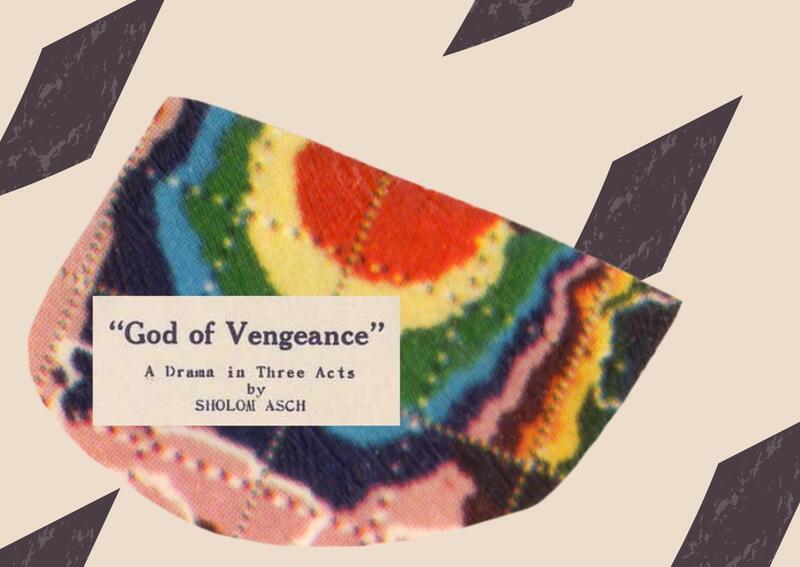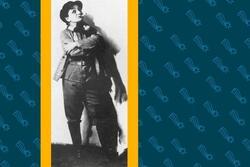How A Scandalous Yiddish Play Inspires Me to Write Bold Theater
At the heart of the 1906 Yiddish play Got fun nekome [God of Vengeance] is the story of two girls in the rain. And at the heart of the 2015 critically acclaimed meta-play Indecent is the story of God of Vengeance.
Indecent follows and fictionalizes the history of the composition and performance of God of Vengeance, telling the story of its real-life writer, Sholem Asch, and the diverging responses of its audiences. Set in a brothel, God of Vengeance depicts exploitation, corruption, and blasphemy, causing its critics to worry that the play might fan the flames of already rampant antisemitism. But while some are scandalized, others are mesmerized. Most controversially — most beautifully — the two girls in the rain, Rivkele and Manke, are in love. The pureness of their love story enchants the most compelling characters of Indecent: an eager stage manager named Lemml; Asch’s wife, who recognizes snippets of dialogue as her own; and actors who for the first time can embrace their queer identity on stage.
In 1923, after success in Europe and off-Broadway in Yiddish, God of Vengeance prepares for an English-language transfer to Broadway. When, in a flurry of revisions, the rain scene is cut, the play loses its soul. Despite these cuts, police shut the production down for “obscenity” after opening night, arresting members of the cast. The creatives who poured their hearts into God of Vengeance are devastated by its closing and weary of the constant struggles of assimilation in the United States.
As Indecent follows the discouraged performers' experiences with escalating antisemitism, the narrative continues to return to the rain scene. The strength of Rivkele and Manke’s love, and its impact on the characters of Indecent, propels the story, infusing even the most tragic moments with a strange hope.
Like Lemml, the eager stage manager, was inspired by God of Vengeance, I've been inspired by Indecent. It showed me a new side of playwriting, one unafraid to jump boldly between moments, stories, and themes. It’s personal and political, poetic and provocative. By celebrating the power of playwriting, Indecent illuminates the power of language. “When one writes a play,” Asch says to his cast, “one is no longer alone.” Words allow Asch to challenge and move his audience and allow the actors of God of Vengeance to finally tell the love stories they’ve been living.
Indecent is a political play about a political play. Co-created by director Rebecca Taichman and playwright Paula Vogel, it demonstrates that it’s impossible to untangle our personal lives, our politics, and our art. As someone who’s invested in creating both real political change and real theater, I sometimes struggle to balance these commitments. I am often either frustrated by the pressure to make my writing political, or the expectation that it would be anything else.
As a frequent lone Jew in progressive spaces, or lone progressive in Jewish spaces, I’ve spent much of the past year and a half worrying I’ve said the wrong thing. In a playwriting class, a teacher once told me that writing about my grandfather’s escape from the Holocaust had to be a metaphor for discussing the suffering of Palestinians. (It wasn’t.) In a Jewish teen fellowship, a peer once told me that queerness had to be, if not an outright sin, a controversial topic of debate. (It wasn’t.) I often leave these conversations feeling angry or defensive. Why should telling my stories or living my life have to be politicized? Why should I, a seventeen-year-old, have to weigh-in on conversations that stump people who can legally vote and buy alcohol? In the liminal space I occupy between childhood and adulthood, I feel responsibility, but not quite responsible. I don’t really know what to say, just that I should be saying something.
Now, don’t get me wrong: I love being political. But I hate when political stances are projected onto me and my work. I hate when they aren’t mine to choose. And I hate when all I need to do to start a controversy is be myself, or write about my history.
In Paula Vogel’s work, there is space for both instincts: the desire to be political, and the desire to just be. She writes provocatively, never shying away from social commentary or stigmatized subject matter (AIDS, sex-work, incest, the Holocaust). She rewrote Othello without any men. She wrote a slightly absurd comedy about lesbian parenthood 30 years before marriage equality. And she wrote the 1994 one-act Hot 'N' Throbbing in part just to oppose a law that diverted public funding from art “offending community values.”
Still, Vogel never lets her politics define her. She is an artist before an activist, and her plays are filled with stories, not slogans. Indecent might be about assimilation, antisemitism, and censorship, but it’s also about what all plays are about — the relationships between people, the feelings vibrating in the air.
In the Broadway production of Indecent, in the two most powerless moments of the play, the troupe stands, defeated, behind a screen covered in words. Nowadays, with the “Jewish perspective” weaponized by every corner of the political spectrum, it can be hard not to feel trapped behind language. The questions Vogel asks in Indecent have only gotten louder: where do we draw the line between necessary criticism and antisemitism? Who should be allowed to represent the Jewish community to a broader audience? In a world of antisemitic violence, how concerned should we be about potentially antisemitic language and art? Should we be more concerned? Less concerned? Is it better to say the wrong thing, or to say nothing at all?
Given the indecency of current events, it’s becoming more and more difficult to write anything apolitical at all. As our world changes, so do our relationships with art, whether we like it or not. The current Broadway revival of Cabaret isn’t really about 1930s Berlin. The recent Broadway production of Goodnight, and Goodluck, starring George Clooney, isn’t really about McCarthyism. Even Wicked would probably like you to think that it’s really about fascism and xenophobia.
I’m excited to continue learning about how to productively engage in political discussions and write political theater. I deserve the time and place to knock on doors and organize campaigns and hold signs with slogans and scream. And I deserve the time and place to write silly plays about inexperienced babysitters and breakups and getting stuck on the subway. But, with Indecent, Paula Vogel was able to write a play filled with both rich characters and social commentary, both questions and answers. A play infused with feminism, queer identity, and Jewish experience — a play that was, at the end of the day, just about two girls in the rain. And if she can do it, I can do it, too.
This piece was written as part of JWA’s Rising Voices Fellowship.






